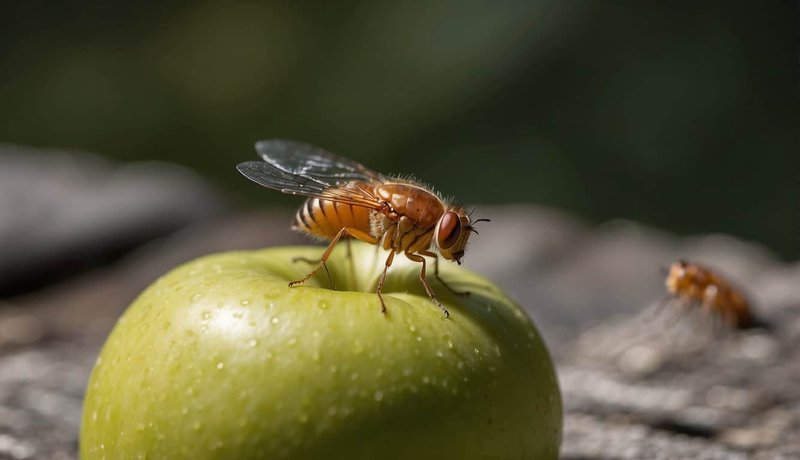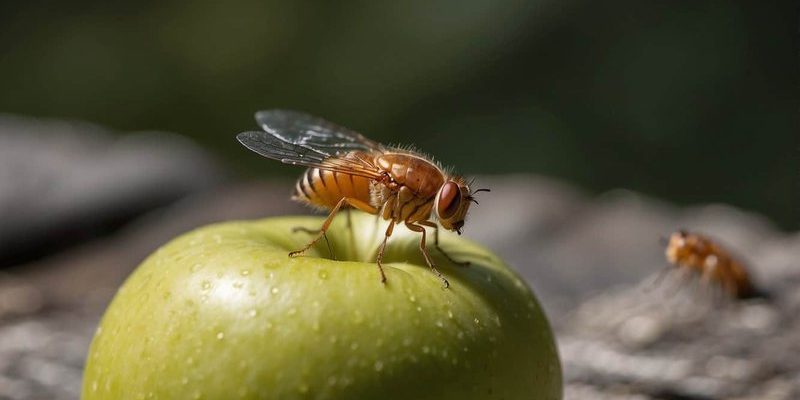
Let’s dive into the world of fruit flies and explore their fascinating symbolism across different cultures. Think of it like peeling back the layers of an onion—each layer reveals something new and surprising. There’s a lot to unpack here, so grab your favorite beverage, and let’s get started!
Fruit Flies in Cultural Contexts
Fruit flies have been a part of human culture for centuries, serving as symbols in various contexts. In many cultures, they represent transience and impermanence. Their brief life cycle—from egg to adult in just a few days—mirrors the fleeting nature of life itself. Much like how a beautiful sunset fades into night, the fruit fly’s life reminds us that everything is temporary.
In literature and art, this symbolism often highlights the theme of decay. For example, a painting featuring fruit flies hovering over rotting fruit can symbolize not just physical decay, but also emotional or spiritual decline. It encourages viewers to reflect on what’s neglected in their lives. Here’s the thing: these tiny creatures remind us to appreciate the here and now before what we love turns to dust.
The Fruit Fly in Science and Innovation
Interestingly, fruit flies are also significant in the realm of scientific research. These little insects are often used in studies on genetics and behavior because they share many genes with humans. The parallels between their genetics and ours make them incredibly valuable for scientific exploration. You might be wondering how that connects to cultural symbolism.
In a way, fruit flies symbolize innovation and the quest for knowledge. Scientists often find inspiration in nature, and the study of fruit flies has led to breakthroughs in understanding human biology and diseases. By studying their life cycles and genetics, researchers have unlocked answers to complex questions. So, when you see a fruit fly next time, think of it not just as a pest, but as a tiny beacon of scientific enlightenment!
Myths and Folklore Surrounding Fruit Flies
Throughout history, fruit flies have appeared in various myths and folk tales, often embodying lessons about life. In some cultures, they’re seen as messengers from the spirit world. Their sudden appearance is thought to signal the presence of a loved one who has passed away, reminding us of our connections to those who came before us. It’s almost poetic, really—the butterfly effect at its finest, where a small creature serves as a bridge between the living and the deceased.
In other tales, fruit flies symbolize greed and gluttony. Just picture a fruit bowl overflowing with luscious berries, only to have a swarm of fruit flies descend upon it. It’s a reminder that excess—whether in food, wealth, or ambition—can lead to one’s downfall. These narratives serve as cautionary tales, urging us to balance our desires and cultivate mindfulness in our lives.
Fruit Flies and Environmental Awareness
As environmental issues become more pressing, fruit flies also take on a new role as indicators of ecological health. Their presence or absence can reveal important truths about ecosystems. In this way, they symbolize both the fragility and resilience of nature. When we see them, it can remind us of the importance of protecting our planet.
Moreover, these tiny insects highlight the interconnectedness of all living things. Just like fruit flies play a vital role in breaking down organic matter, we, too, have responsibilities to our environment. They encourage us to reflect on our impact and inspire us to advocate for more sustainable practices.
Fruit Flies in Popular Culture
You might have noticed that fruit flies also make appearances in popular culture, from movies to music. They often represent the chaos of life or the surprising moments when things don’t go as planned. Think about scenes in films where characters are overwhelmed by life’s little annoyances—fruit flies are typically there to add humor and realism.
In music, artists sometimes use fruit flies to symbolize fleeting beauty. Lines referring to these insects often evoke feelings of nostalgia or longing. It’s like a gentle nudge to cherish the good moments, even when they’re temporary.
Personal Reflections on the Symbolism of Fruit Flies
Reflecting on the symbolism of fruit flies invites us to think about our own lives. They remind us of the importance of embracing the present and acknowledging both the beauty and the messiness around us. Honestly, every time I swat away a fruit fly, I try to remember the deeper meaning behind its presence.
You might find it rewarding to keep a journal, jotting down your feelings and thoughts whenever you encounter these tiny creatures. What do they make you reflect on? Do they remind you to slow down and appreciate what you have? Personal connections to such little aspects of nature can yield profound insights.
In conclusion, the cultural symbolism of the fruit fly is rich and multifaceted. From representing the fleeting nature of life to highlighting our connections with the environment, these tiny insects offer more than meets the eye. They bridge science, mythology, and personal reflection, reminding us to appreciate each moment and to recognize the beauty in life’s complexities.
So next time you see a fruit fly, take a moment to ponder what it represents for you. Whether it’s a reminder to savor your surroundings or an inspiration to explore scientific curiosities, this little insect carries a weighty message that continues to resonate throughout cultures. Embrace the fruit fly not just as a pest, but as a symbol of life in all its unpredictability and beauty!

